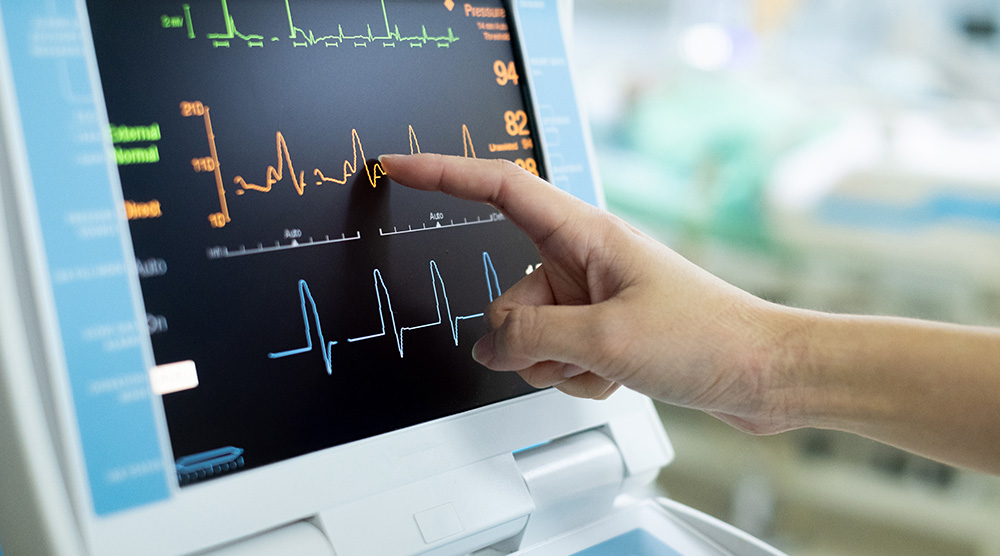On-Site Cardiac Testing

Heart Monitors
Holter Monitor: A Holter monitor is a device that keeps track of heart rhythm for 24-48 hours. During that time, the device records all heartbeats. The doctor uses information captured on the Holter monitor to figure out if there is a heart rhythm problem.
myPatch / Zio Patch / Bardy: These patches are small, wireless, light-weight, and water proof heart rate monitors that are applied to the chest to detect different kinds of irregular heart rhythms. They are worn during normal day-to-day activities including sleep, shower, and exercise to record every single heartbeat for analysis.
Nuclear Testing
Lexiscan (Nuclear Stress Test): A small amount of radioactive tracer is injected into the blood before and after an injection of a medication called Lexiscan, and pictures are taken of the heart muscle. Lexiscan replaces the physical act of exercise, and elicits the same response from the body that would occur if it were actually exercising. The pictures that are taken before and after the Lexiscan injection are then compared to each other, to see if there are any differences. The Lexiscan stress test is useful to determine: If there is adequate blood flow to the heart during increasing levels of activity, extent of a coronary artery blockage, or cause(s) of chest pain. Test Length: 1 ½ – 2 hours
Twelve (12) hours prior to your scheduled appointment time:
- No caffeine: coffee, tea, (including decaffeinated), herbal tea, sodas, or chocolate.
- No cold medications, unless approved by your doctor.
- No smoking, chewing tobacco, or nicotine gum/patches.
- No alcoholic beverages.
- No lotion, oils, or powders in the chest area.
Four (4) hours prior to your scheduled appointment time:
- No food, only plain water.
*Please dress in comfortable clothing.
*Drink plenty of water the day before, and the day of your exam.
Our office will contact you approximately two (2) days before your exam to review instructions and answer any questions.
PET Scan: A heart positron emission tomography (PET) scan is an imaging test that uses a radioactive substance called a tracer to look for poor blood flow in the heart. A heart PET scan can detect whether areas of your heart muscle are receiving enough blood, if there is heart damage or scar tissue in the heart, or if there is a buildup of abnormal substances in the heart muscle.
How the PET Scan is Performed:
- The tracer is given through a vein (IV), most often on the inside of the elbow.
- It travels through blood and collects in organs and tissues, including the heart.
- While lying down on a narrow table which slides into a large tunnel-shaped scanner, electrodes for an electrocardiogram (EKG) will be placed on the chest. The PET scanner detects signals from the tracer.
- The images are displayed on a monitor for the radiologist to read.
Test Length: 1 hour Instructions:
Twelve (12) hours prior to your scheduled appointment time:
- No caffeine: coffee, tea, (including decaffeinated), herbal tea, sodas, or chocolate.
- No cold medications, unless approved by your doctor.
- No smoking, chewing tobacco, or nicotine gum/patches.
- No alcoholic beverages.
- No lotion, oils, or powders in the chest area.
Four (4) hours prior to your scheduled appointment time:
- No food, only plain water.
*Please dress in comfortable clothing.
*Drink plenty of water the day before, and the day of your exam.
Our office will contact you approximately two (2) days before your exam to review instructions and answer any questions.
Stress Testing
Stress Echocardiogram: This test starts with a resting echocardiogram to get an ultrasound of the heart’s movement. Once the sonographer is done with the echocardiogram, the patient will exercise on a treadmill. After exercising, the sonographer will perform another echocardiogram.
Instructions: Wear comfortable shoes/clothing and no lotions or powder on the chest. Test Length: 1 hour
Stress Test (Treadmill): This test is done to monitor the heart and blood pressure while exercising on a treadmill. A stress test may be done to detect coronary artery disease, diagnose heart rhythm problems (arrhythmias) or to determine safe levels of exercise after a heart attack or heart surgery. Instructions: Wear comfortable shoes/clothing and no lotions or powder on the chest. Test Length: 30 minutes
Ultrasound Testing
Ankle-brachial index (ABI): This test compares the blood pressure measured at the ankle with the blood pressure measured at the arm. A low ankle-brachial index number can indicate narrowing or blockage of the arteries in the legs. Test Length: 1 hour
Aortic Duplex: This ultrasound evaluates the main artery of the abdomen (aorta), and the arterial branches that deliver blood flow to the major organs of the body. Test Length: 1 hour
Arterial Duplex: Ultrasound of blood flow in arteries of the arms and/or legs to identify: Narrowing of vessels that may be causing leg pain while walking or resting, foot ulcers, or skin discoloration. Test Length: 1 hour
Bubble Echocardiogram: An Echo Bubble Study is an injection of saline after agitation to create micro-bubbles that are ultrasound reflective into a vein in order to reach and opacify the right heart chambers. Normally, lungs will simply filter out the bubbles, but if there is a tiny opening between the heart’s upper chambers (the right and left atria), some bubbles will move through that hole and appear on the left side of the heart. Test Length: 1 hour
Carotid: Ultrasound of the carotid arteries in the neck to evaluate how they carry blood to the head/brain. Test Length: 45 minutes
Echocardiogram (ECHO): An echocardiogram is an ultrasound of the heart that uses sound waves to evaluate the heart’s chambers and valves, as well as its pumping function. Test Length: 45 minutes
Renal Artery Duplex: This ultrasound examines the renal arteries and measures the blood flow through the arteries. These arteries can narrow or become blocked which can result in hypertension (high blood pressure). Test Length: 1 hour
Venous Duplex: This is an ultrasound of the veins in one or both legs. This is performed to evaluate symptoms including: leg pain or swelling, excessive varicose veins, or suspected blood clots in the legs/lungs. Test Length: One leg – 30 minutes, Both legs – 1 hour
Venous Reflux Duplex: Ultrasound to examine the deep and superficial veins in the legs in order to see if there are any blood clots that may have developed which would prohibit blood flow of the venous valves through the legs. Test Length: 1 hour


